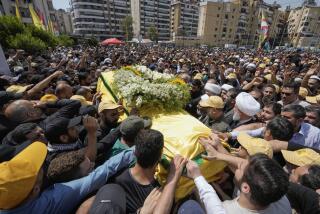Would-be successor to slain Pakistani Taliban chief reportedly killed in clash with rival
- Share via
ISLAMABAD, PAKISTAN, AND PESHAWAR, PAKISTAN — A would-be successor to Pakistani Taliban leader Baitullah Mahsud reportedly was killed Saturday in a gun battle between rival factions of the militant group, a sign that rifts are surfacing in the wake of his death in a U.S. missile strike.
Hakimullah Mahsud, regarded as a leading candidate to replace Baitullah Mahsud, was shot and killed in the exchange of gunfire, said intelligence officials who spoke on condition of anonymity. The two Mahsuds are not believed to have been related.
The shootout reportedly took place Saturday in South Waziristan after a meeting of Taliban leaders discussing who would replace Mahsud.
Hakimullah Mahsud and another Taliban commander, Wali ur-Rehman, argued at that meeting, and Mahsud was killed afterward, the intelligence officials said. Rehman was injured, they said, and two other people were killed.
Earlier Saturday, Hakimullah Mahsud, in an interview with the BBC’s Urdu Service, denied that Baitullah Mahsud was dead. He said that the Taliban leader soon would issue a message to confirm that he was alive. Analysts say Hakimullah Mahsud’s denial might have been a way of trying to keep militants unified while a successor was chosen.
Late Saturday, Pakistani Interior Minister Rehman Malik said one of the two Taliban commanders vying to replace Mahsud had been killed in the clash, but he did not say whether it was Hakimullah Mahsud or Rehman.
“I have information that one of them is dead,” Malik said. “I can only confirm that once we have seen the body, and have the material evidence. I hope to have that within the next 24 hours.”
One of Baitullah Mahsud’s deputies denied that any clash or dispute took place.
“There are no differences between the two commanders, and reports about the death of Hakimullah are totally baseless,” said the deputy, Noor Sayed.
Baitullah Mahsud, long regarded as Pakistan’s top terrorist target, was killed in a missile attack by a CIA Predator drone early Wednesday at a house belonging to Mahsud’s father-in-law. One of Mahsud’s wives also was killed.
Pakistani Foreign Minister Shah Mehmood Qureshi and a top Mahsud aide confirmed the Taliban leader’s death, though Pakistani officials have said they want to gather forensic evidence to verify his death.
Mahsud’s killing represents a major setback for the Taliban movement in Pakistan, which is responsible for many of the suicide bombings and other attacks that have plagued the country. Mahsud was suspected as the mastermind of the assassination of former Prime Minister Benazir Bhutto in December 2007.
Mahsud was particularly adept at maintaining unity among the various militant groups roaming Pakistan’s tribal areas.
Analysts have said that his death leaves the movement vulnerable to rifts that could eventually cause the organization to fragment.
--
Ali is a special correspondent
More to Read
Sign up for Essential California
The most important California stories and recommendations in your inbox every morning.
You may occasionally receive promotional content from the Los Angeles Times.












